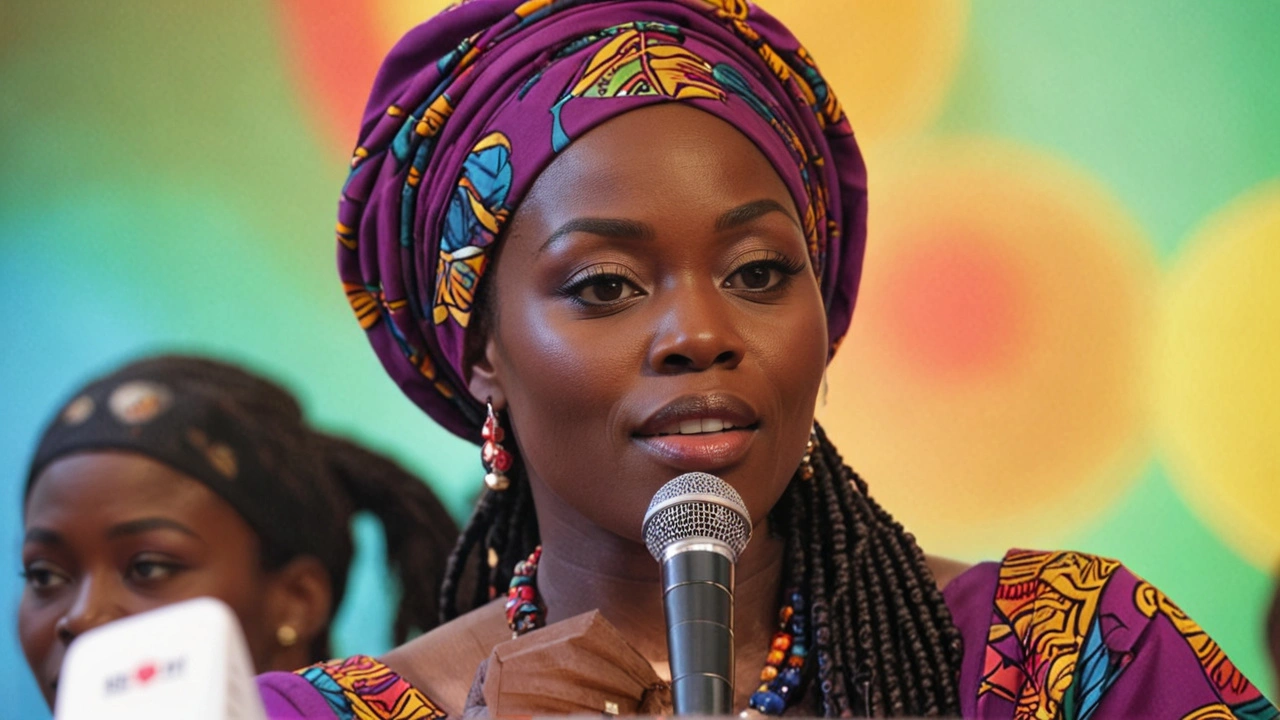Nigeria's First Lady Remi Tinubu Offers Condolences To Bukola Saraki's Family Following Mother's Death

First Lady Remi Tinubu Mourns With Saraki Family
The solemn atmosphere at the Saraki residence in Lagos was marked by the visit of Senator Oluremi Tinubu, the First Lady of Nigeria, who came to offer her sincere condolences following the recent death of the family's matriarch. The loss of Bukola Saraki's mother has undoubtedly left a deep void within the family, and the presence of the First Lady underscored the significance of unity and support during such challenging times.
Arriving at the Saraki home on a quiet Tuesday morning, Senator Tinubu approached the grieving family with a demeanor of genuine empathy and understanding. Her gesture was not just a formality often observed in political circles, but a heartfelt expression of solidarity. This visit highlighted Senator Tinubu’s personal commitment to standing beside those mourning their loved ones, irrespective of their political affiliations or social status.
The Personal and Political Connection
Oluremi Tinubu's visit to the Saraki family is particularly poignant given the political history shared between the Tinubu and Saraki names in Nigeria. Bukola Saraki, a former Senate President, has had a prominent political career with profound impacts on Nigeria's legislative landscape. Despite any political differences or past divergences, the visit from the First Lady serves as a reminder that, beyond politics, are shared human experiences and connections.
The death of a mother is an irreplaceable loss, and for Bukola Saraki and his family, it marks the end of an era. The presence of the First Lady was a beacon of the collective empathy from the nation’s leadership, showing that in times of sorrow, they can bridge gaps and extend warmth and support.

A Tradition of Empathy and Support
Senator Tinubu’s visit reinforces a longstanding tradition among Nigerian leaders to personally extend their sympathies to families facing such tragedies. This act of kindness is integral in nurturing national unity and emotional resilience. It transcends the realm of politics and taps into the deeper, universally shared human experience of loss and mourning.
Her visit was not merely symbolic but also a gesture that adds a layer of emotional and psychological support to those who are grieving. It is a practice that helps to humanize political figures in the eyes of the public and encourages a culture of empathy within societal leadership. This kind of leadership, grounded in compassion, can have far-reaching effects on the nation as a whole.
The Power of Connection During Grief
Grief is a universal experience, uniting people across all divides. In paying her respects, Senator Tinubu set a poignant example for other public figures. Such acts of consideration ensure that those in the public eye remain accessible and empathetic to the populace's needs. The First Lady's action is a testament to the power of personal connections in healing and offering comfort in times of loss.
Moreover, these moments of shared sorrow foster a sense of common humanity, reminding everyone that despite any differences, our fundamental human experiences are the same. For the Saraki family, this visit will, without a doubt, remain a memorable instance of national solidarity.

A Message to the Nation
Through her actions, Senator Oluremi Tinubu has sent out a powerful message to the nation. Her visit is an indication of caring leadership and a reminder of the solidarity that binds Nigerian society together. It encourages others to show empathy and support in their communities, reinforcing the importance of reaching out to those in need of comfort.
As the Saraki family navigates through this challenging period, the First Lady's condolence visit will be remembered as a significant moment of support and compassion. It illustrates that in moments of grief, leadership anchored in empathy and humanity can provide profound solace and strength.
Looking Ahead
In the wake of this loss, the Saraki family will undoubtedly find strength in the support extended by their community and leaders. Senator Oluremi Tinubu's visit not only provided immediate comfort but also set a precedent for how leaders can engage meaningfully with those they serve. This gesture may inspire many to act with similar compassion in their daily lives, creating a ripple effect of kindness and understanding throughout the nation.






Kimberly Hickam
July 17, 2024 AT 22:34It's fascinating how moments of grief become a stage for political theater; when the First Lady steps into a private household, she's not just offering condolences, she's broadcasting a message of unity that transcends party lines.
One could argue that this gesture is a reminder that behind every headline there are human stories, and that leaders, regardless of their power, are still bound by the universal experience of loss.
Yet, the symbolism runs deeper, echoing the long history of Nigerian politics where personal alliances often eclipse ideological battles, turning a simple act of sympathy into a subtle endorsement of political goodwill.
The timing of the visit, on a quiet Tuesday morning, also suggests a calculated calm amidst the storm of public scrutiny, allowing the narrative to shift from partisan debates to shared mourning.
In many cultures, the presence of an influential figure at a funeral home is a sign of respect, but here it also serves as a strategic reminder that the Tinubu family remains intertwined with the Saraki lineage, historically one of the most prominent power blocs.
From a sociological perspective, such gestures reinforce the notion that leadership is not merely about legislation, but about embodying communal values, especially in moments that expose our collective vulnerability.
Moreover, the optics of a First Lady offering heartfelt words can soften the perceived distance between the ruling elite and the average citizen, creating a veneer of empathy that can be politically advantageous.
It's also worth noting that public displays of compassion often ripple through social media, shaping the discourse and potentially influencing public opinion ahead of upcoming elections.
When you consider the delicate balance of power in Lagos and the broader national arena, the visit becomes a subtle diplomatic maneuver, quietly reminding rivals that solidarity can be as potent as policy.
The emotional weight of a mother's death is undeniable, and the presence of a national figure can provide a semblance of comfort that transcends bureaucratic formalities.
This interplay of grief and governance highlights how personal loss can be co-opted into the fabric of political narrative, blurring the lines between genuine empathy and strategic posturing.
Furthermore, the act underscores a tradition within Nigerian leadership circles: a public acknowledgment that personal tragedies are shared experiences, deserving of national recognition.
One might also reflect on how such moments could set a precedent, encouraging other leaders to adopt a more humanized approach in their interactions with constituents.
In the end, the First Lady's visit is a poignant reminder that politics, at its core, is still about people, their hopes, their sorrows, and the bridges we build in between.
Thus, while the ceremony may have been solemn, its reverberations are likely to echo far beyond the walls of the Saraki residence, shaping narratives of unity and compassion for months to come.
Gift OLUWASANMI
July 19, 2024 AT 02:20Don't be fooled by the glossy photo op; it's a classic case of political tokenism dressed up in funeral flowers, a performative act that pretends to care while silently reinforcing power structures.
Keith Craft
July 20, 2024 AT 20:00Ah, the weight of a mother’s farewell does not discriminate, yet we watch it through a lens of grandiosity, as if the First Lady’s presence could rewrite the very fabric of personal loss, a stage set with all the pomp yet stripped of genuine solace. Her courteous nods and whispered words become theatrical cues, directing the audience toward a narrative of unity that feels rehearsed. One cannot ignore the dissonance between the solemnity of grief and the orchestrated poise of political decorum. In the quiet corridors of the Saraki home, the echo of statecraft mingles with the sighs of mourning, a juxtaposition that feels both intimate and invasive. The whole scene, though well‑intentioned, reads like a scripted tableau where compassion is choreographed rather than spontaneously felt.
Kara Withers
July 23, 2024 AT 03:34Understanding how leaders publicly express sympathy can offer insight into the cultural expectations of political figures in Nigeria; such gestures often aim to bridge the gap between personal tragedy and national solidarity, fostering a sense of communal support.
boy george
July 26, 2024 AT 01:00That’s a kind move.
Cheryl Dixon
July 29, 2024 AT 12:20While some may view the gesture as mere theater, it also underscores the intrinsic human desire to find connection even amidst institutional settings, suggesting that perhaps sincerity and performance can coexist in complex ways.
Ramesh Modi
August 2, 2024 AT 13:34Indeed!; the very act of a First Lady stepping into a private sorrow-laden with symbolism, tradition, and political nuance-cannot be dismissed as simple courtesy; it is, in fact, a layered tapestry of empathy, power, and public expectation, weaving together threads of personal loss, national identity, and the relentless march of political theater, all while reminding us that even the grandest of gestures are subject to the unforgiving scrutiny of a populace yearning for authenticity!